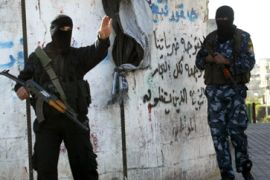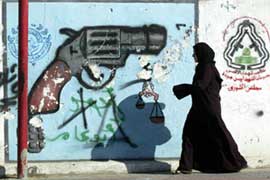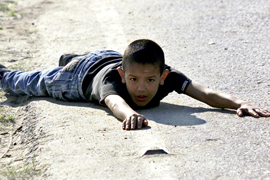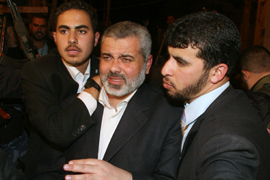Palestinian politics a battleground
Growing chaos in Gaza and the West Bank is making Palestine a battleground for foreign powers.

As tensions escalate between factions Fatah and Hamas, some are eying with concern how the involvement of regional rivals is playing out in Palestine.
Four more people have been killed in violence and revenge killings in the Gaza Strip and West Bank since President Mahmoud Abbas called for early presidential and parliamentary elections on Saturday.
 |
| Conflict between rival Palestinian groups has grown increasingly bitter |
The rising death toll comes after months of negotiations between Fatah, headed by Abbas, and Hamas over forming a national unity government. Hamas won a majority in January 2006 parliamentary elections and Fatah has resisted surrendering positions it dominated for decades.
Both factions have reached out to other countries to shore up power.
Foreign alliances
In his Saturday speech, Abbas warned against these ties. He noted the price Palestinians paid for the Palestine Liberation Organization’s perceived support of Iraq’s 1990 invasion of Kuwait. The PLO lost funding and Palestinians were expelled from Kuwait.
|
We refuse any regional or international alliances. We don’t want to engage in a war against anyone. We are still under occupation.” Mahmoud Abbas Palestinian president |
“We refuse any regional or international alliances,” said Abbas. “We don’t want to engage in a war against anyone. We are still under occupation.”
But Abbas himself has hinged his position in talks with Hamas on the three conditions laid down by the Quartet.
The Quartet, comprised of representatives from the US, United Nations, Russia and the European Union, has said Hamas must recognize Israel, accept previous signed agreements, and lay down its arms before its government will receive international acceptance and funds.
A letter sent from Abbas to the cabinet after negotiations with Hamas broke down firmly set conditions for a renewal in talks – among them Ismail Haniyeh’s resignation as prime minister.
United States and Iran
Some Palestinians say US-led opposition to the Hamas-led government is drawing battle lines for the entire region.
“The US administration wants to create a new Middle East,” acting parliament speaker Hassan Khreisheh told Aljazeera.net.
“This new Middle East demands that countries allied to the US – Egypt, Jordan, and the Gulf countries – are pit against Iran, Syria, Hezbollah and Hamas.”
This summer’s hostilities between Hezbollah and Israel have also exacerbated conflicting interests between the Iranian- and Syrian-backed Lebanese movement, and US allies among ‘moderate’ Arab countries.
In July, Jordan, Saudi Arabia and Egypt indirectly blamed Hezbollah for the escalation of violence – a rift seen to be creating a common front to counter Iran’s growing influence in the region.
Trapped
Hezbollah’s political gains in the aftermath of its war with Israel and the perception that it was militarily able to hold of the Jewish State, have also emboldened and provided ideological support for Hamas.
|
“Any help from the Americans, whether in South America, in Europe, or in Asia causes those who have direct support from the Americans to become weak” Qadura Fares Fatah activist |
Independent parliamentarian Khreisheh blamed both Fatah and Hamas for playing into this scenario by miscalculating and making grievous mistakes.
While Fatah called for a public strike and rallied opposition to Hamas, the Islamist movement further entrenched itself in the hopes of support it would receive from Arab states.
But support from Arab countries like Egypt – long considered a power-broker in Middle East conflicts – seems to be waning.
Egyptian intelligence chief Omar Suleiman surprised foreign diplomats in October when he told them that Hamas must be forced from power, reported the Israeli daily Mari.
“I am pleased a moderate axis of countries in the Arab world has been created that wants to take part in blocking Iran’s influence on the region,” Israeli Prime Minister Ehud Elmer said in an October policy speech.
“The Iranian threat is aimed not only against Israel and the free world, but also against Arab countries around us.”
Banks take sides?
This regional tug-of-war is reflected most clearly in the cash-starved Palestinian economy.
Regional banks have also stepped into the foray as mounting concern about US anti-terrorism statues have coerced them to bar transfer of monies to the Palestinian government.
Acting Palestinian finance minister Samira Abu Either told Aljazeera.net that Arab and Muslim promises to support the government fell short of expectations due to the banking boycott and regional political concerns.
Promises of funding
As the war of words is replaced by armed clashes, each faction is now accusing the other of being beholden to foreign interests.
During a visit to Ramallah, US Secretary of State Condoleezza Rice pledged $20 million to build up armed forces that report to the Palestinian president directly.
 |
| A Palestinian boy lies down in road during fighting, Beit Hanoun, Gaza [AFP] |
Days later, Reuters reported that the US was also giving $42 million to help support political alternatives to Hamas.
Now Iran has pledged to give Palestinians $250 million in aid, some in direct funding for the government and another portion in agricultural subsidies and development.
These commitments fall short of the government’s annual budget, most of which comes from tax revenues currently frozen by Israel.
“We don’t deny that the Palestinian field is complicated,” interior minister Sayid Siam said in an interview posted on a Hamas website during an October visit to Iran, “but at this time, we reject that there are Palestinian ‘sides’.
“This is a part of the plot or part of the pressure on the Palestinian government.”
Border clash
When Haniya was stopped at the Rafah crossing from entering Gaza last week, it was reported he had been carrying millions of dollars for the cash-strapped government he leads.
A gun battle ensued when his guards tried to force their way through, and several people were killed and injured. Haniya was reportedly allowed to enter without the finances he was carrying.
Hamas blamed Abbas for caving in to US and Israeli pressures.
Pressure and backlash
The arming of competing Palestinian factions is reminiscent of the Cold War era where disputes between major powers were fought by proxy.
 |
| Ismail Haniyeh has toured the region to raise funds for the Hamas government |
“Any help from the Americans, whether in South America, in Europe, or in Asia causes those who have direct support from the Americans to become weak,” says Fatah activist Qadura Fares.
While Fares is not opposed to accepting US grants, he argues that open US support for Fatah will backfire.
“I believe that the Americans like this situation,” he told Aljazeera.net.
“Hamas remains in the framework of terror, and Fatah is a bit like the collaborator of the Americans and the Israelis. Then Palestinians don’t believe in Fatah or Hamas, and the Israelis continue their planning, building settlements and creating a new atmosphere in Palestine.”
Hamas leaders, on the other hand, say they are unfazed.
Minister of prisoner affairs Wasfi Kabaha is confident that the public will see through attempts to manipulate local politics for regional change.
“Palestinian society is sensitive and transparent,” he told Aljazeera.net.
“Any party can [try to] interfere in internal relations, but the Palestinian public has formed a consensus.”